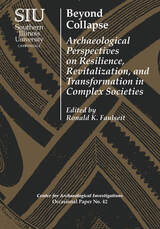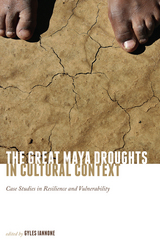2 books by Iannone, Gyles

Beyond Collapse
Archaeological Perspectives on Resilience, Revitalization, and Transformation in Complex Societies
Edited by Ronald K. Faulseit
Southern Illinois University Press, 2015
The Maya. The Romans. The great dynasties of ancient China. It is generally believed that these once mighty empires eventually crumbled and disappeared. A recent trend in archaeology, however, focusing on what happened during and after the decline of once powerful societies has found social resilience and transformation instead of collapse. In Beyond Collapse: Archaeological Perspectives on Resilience, Revitalization, and Transformation in Complex Societies, editor Ronald K. Faulseit gathers scholars with diverse theoretical perspectives to present innovative approaches to understanding the decline and reorganization of complex societies.
Essays in the book are arranged into five sections. The first section addresses previous research on the subject of collapse and reorganization as well as recent and historic theoretical trends. In the second section, contributors look at collapse and resilience through the concepts of collective action, eventful archaeology, and resilience theory. The third section introduces critical analyses of the effectiveness of resilience theory as a heuristic tool for modeling the phenomena of collapse and resilience. In the fourth section, contributors examine long-term adaptive strategies employed by prehistoric societies to cope with stresses. Essays in the fifth section make connections to contemporary research on post-decline societies in a variety of time periods and geographic locations.
Contributors consider collapse and reorganization not as unrelated phenomena but as integral components in the evolution of complex societies. Using archaeological data to interpret how ancient civilizations responded to various stresses—including environmental change, warfare, and the fragmentation of political institutions—contributors discuss not only what leads societies to collapse but also why some societies are resilient and others are not, as well as how societies reorganize after collapse. The implications of the fate of these societies for modern nations cannot be underestimated. Putting in context issues we face today, such as climate change, lack of social diversity, and the failure of modern states, Beyond Collapse is an essential volume for readers interested in human-environment interaction and in the collapse—and subsequent reorganization—of human societies.
Essays in the book are arranged into five sections. The first section addresses previous research on the subject of collapse and reorganization as well as recent and historic theoretical trends. In the second section, contributors look at collapse and resilience through the concepts of collective action, eventful archaeology, and resilience theory. The third section introduces critical analyses of the effectiveness of resilience theory as a heuristic tool for modeling the phenomena of collapse and resilience. In the fourth section, contributors examine long-term adaptive strategies employed by prehistoric societies to cope with stresses. Essays in the fifth section make connections to contemporary research on post-decline societies in a variety of time periods and geographic locations.
Contributors consider collapse and reorganization not as unrelated phenomena but as integral components in the evolution of complex societies. Using archaeological data to interpret how ancient civilizations responded to various stresses—including environmental change, warfare, and the fragmentation of political institutions—contributors discuss not only what leads societies to collapse but also why some societies are resilient and others are not, as well as how societies reorganize after collapse. The implications of the fate of these societies for modern nations cannot be underestimated. Putting in context issues we face today, such as climate change, lack of social diversity, and the failure of modern states, Beyond Collapse is an essential volume for readers interested in human-environment interaction and in the collapse—and subsequent reorganization—of human societies.
[more]

The Great Maya Droughts in Cultural Context
Case Studies in Resilience and Vulnerability
Gyles Iannone
University Press of Colorado, 2014
In The Great Maya Droughts in Cultural Context, contributors reject the popularized link between societal collapse and drought in Maya civilization, arguing that a series of periodic “collapses,” including the infamous Terminal Classic collapse (AD 750–1050), were not caused solely by climate change–related droughts but by a combination of other social, political, and environmental factors. New and senior scholars of archaeology and environmental science explore the timing and intensity of droughts and provide a nuanced understanding of socio-ecological dynamics, with specific reference to what makes communities resilient or vulnerable when faced with environmental change.Contributors recognize the existence of four droughts that correlate with periods of demographic and political decline and identify a variety of concurrent political and social issues. They argue that these primary underlying factors were exacerbated by drought conditions and ultimately led to societal transitions that were by no means uniform across various sites and subregions. They also deconstruct the concept of “collapse” itself—although the line of Maya kings ended with the Terminal Classic collapse, the Maya people and their civilization survived.
The Great Maya Droughts in Cultural Context offers new insights into the complicated series of events that impacted the decline of Maya civilization. This significant contribution to our increasingly comprehensive understanding of ancient Maya culture will be of interest to students and scholars of archaeology, anthropology, geography, and environmental studies.
[more]
READERS
Browse our collection.
PUBLISHERS
See BiblioVault's publisher services.
STUDENT SERVICES
Files for college accessibility offices.
UChicago Accessibility Resources
home | accessibility | search | about | contact us
BiblioVault ® 2001 - 2024
The University of Chicago Press









